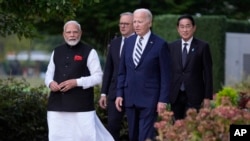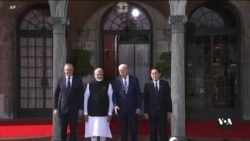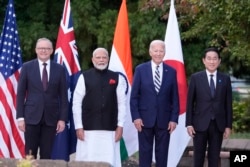U.S. President Joe Biden on Saturday hosted the leaders of Australia, India and Japan at his private home in the U.S. state of Delaware for his final convening of the Quad, a strategic security grouping focused on the Indo-Pacific.
But it was Biden’s comments, unintentionally heard by the press, that illuminated the main topic at this unusually private meeting -- and that topic was China.
Biden said his administration reads Beijing’s recent actions, including flexing its territorial muscles, as a "change in tactic, not a change in strategy."
"We believe [Chinese President] Xi Jinping is looking to focus on domestic economic challenges and minimize the turbulence in China’s diplomatic relationships, and he's also looking to buy himself some diplomatic space, in my view, to aggressively pursue China's interests," Biden told the other three leaders in what he said were prepared remarks.
"China continues to behave aggressively, testing this all across the region, and it's true in the South China Sea, the East China Sea, South China, South Asia and the Taiwan Straits. It’s true across the scope of our relationship, including in economic and technology issues," he added.
Beijing claims almost all of the South China Sea, including territory claimed by Brunei, Malaysia, the Philippines and Vietnam. It also claims territories in the East China Sea contested by Japan and Taiwan. It views democratically governed Taiwan as part of China.
Publicly, Biden’s message was shorter, simpler – "The Quad is here to stay."
Those six words were also the final sentence of a lengthy joint statement from Biden and Australian Prime Minister Anthony Albanese, Indian Prime Minister Narendra Modi, and Japanese Prime Minister Fumio Kishida. The group issued their nearly 5,700-word missive after a day of meetings so cloistered that the president of the White House Correspondents’ Association called the lack of access "unacceptable."
In their statement, the quartet announced moves they say will boost cooperation among the four democracies and address concerns beyond their borders in the massive region, home to more than half of the world’s population and two-thirds of its economy. While they used the word "China" sparingly – only three times, and all three times in reference to the South China Sea – they made very clear how their stance differs from Beijing’s.
"As four leading maritime democracies in the Indo-Pacific, we unequivocally stand for the maintenance of peace and stability across this dynamic region, as an indispensable element of global security and prosperity," they said.
"We strongly oppose any destabilizing or unilateral actions that seek to change the status quo by force or coercion. We condemn recent illicit missile launches in the region that violate U.N. Security Council resolutions. We express serious concern over recent dangerous and aggressive actions in the maritime domain. We seek a region where no country dominates and no country is dominated — one where all countries are free from coercion and can exercise their agency to determine their futures."
China has previously called out the Quad for its thinly veiled criticisms of China, with a Foreign Affairs Ministry spokesperson in July comparing the grouping to "exclusive clubs that undermine trust and cooperation among regional countries."
Biden spoke briefly to tout the major steps, including one that aims to strengthen maritime security, and that will inevitably affect China’s maritime presence in others’ waters.
"We're announcing a series of initiatives to deliver real, positive impact for the Indo-Pacific that includes providing new maritime technologies to our regional partners, so they know what's happening in their waters, launching cooperation between coast guards for the first time, and expanding the Quad fellowship to include students from Southeast Asia," Biden said.
That includes, the leaders’ statement said, a 2025 joint mission by the four nations’ coast guards. That step is also something that Japanese officials presented as a big summit takeaway when briefing reporters earlier in the day. Earlier in the week, when a top U.S. officials previewed the summit, he said the aim is to counter illegal fishing – adding, tellingly, that the vast majority of illegal fishing vessels are Chinese.
VOA asked the Japanese officials about a point of contention between Washington and Tokyo: Biden’s opposition, on national security grounds, to a proposed takeover of U.S. Steel by Nippon Steel. Biden administration officials appeared to play down the matter, noting that the Committee on Foreign Investment in the United States recently extended its review into the deal, pushing any decision past November.
"The president will obviously allow that process to run its course because that’s what’s required from the law, and then we will see what happens," Jake Sullivan, the White House national security adviser, told reporters Saturday.
The American steel company is headquartered in Pennsylvania, an electorally critical state in the fast-approaching U.S. presidential election.
VOA asked the Japanese government to share Toyko’s position on the politically sensitive merger. Japanese officials would not say whether Biden and Kishida even planned to speak on this topic in any of their meetings.
"As a government we refrain from commenting on that," replied a Foreign Affairs Ministry official, who briefed reporters on condition of anonymity. The official quickly added that Japan is the No. 1 investor in the U.S., and that Tokyo hopes the countries’ cooperation will continue.
Australia’s leader said it matters that the four "like-minded countries," all democracies, work together.
"We assert the view that national sovereignty is important, that security and stability is something that we strive for, as well as shared prosperity in our region," Albanese said.
Analysts had predicted China discussion would dominate behind the scenes, but the leaders would refrain from publicly poking Beijing.
"That doesn’t show up in the readouts," Rafiq Dossani, a longtime Asia scholar, told VOA ahead of the summit.
The four leaders began to meet yearly, in person, under Biden’s presidency. Much of their effort, said analyst Kathryn Paik of the Center for Strategic and International Studies, is directed at bread-and-butter governance issues such as health, infrastructure, maritime security and resources, and people-to-people ties.
"This is certainly not a Contain-China club," she told VOA.
But, said Dossani, who is a senior economist at the Rand research corporation and a professor of policy analysis, there is room for the Quad to evolve.
"The question is as the competition, or the rivalry, between China and the U.S. evolves, how will that at that time affect the deliberations?" he said. "As the Chinese economy recovers and they become more assertive, then you'll see a different context for the dialogue."
In the present, though, Biden sees this dialogue among the four leaders as important to his legacy, Paik said.
"It was a central piece to the Indo-Pacific strategy, and elevating the Quad to the leader level has been a significant piece of that strategy," she said. "Just the fact that the Quad has met annually at the leader level every year of Biden's administration is quite significant."
VOA’s Celia Mendoza in Wilmington, Delaware, and Paris Huang and Kim Lewis, in Washington, contributed to this report.







